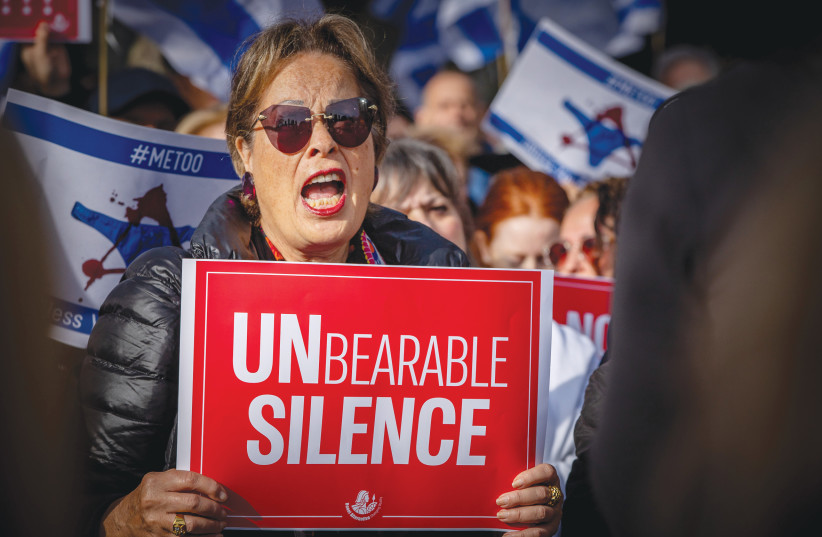The signs of sexual violence were there from the beginning. Shani Louk’s mangled naked body paraded around Gaza. Naama Levy handcuffed, violently pulled from a truck, visibly bleeding through her pants.
Some of the first images we saw during the October 7 Hamas massacre in southern Israel were of women objectified, degraded and naked.
As the days and weeks went on, the reports grew more and more grim. Forensic investigators began to speak for those whose voices had been stolen by Hamas. They told of bone-chilling horrors – such as repeated gang rapes that were so brutal they left women and girls with broken pelvises and mutilated genitals.
Eyewitnesses from the Supernova festival came forward sharing stories of gang rape, torture, and murder. Zaka volunteers discovered rape victims who were tortured, dismembered, and burned alive.
Denial of October 7 must be treated as Holocaust denial
Yet there was deafening silence from the international feminist community. Within that veil of silence came denial. And so has begun the race for documentation, international recognition, and condemnation.

One thing we have learned from conspiracy theorists is that we don’t have much time – the clock is ticking, and deniers are already mobilizing against victims. The denial of widespread, preplanned mass rape and sexual violence on October 7 must therefore be treated with the same revulsion as Holocaust denial.
Hamas has denied that the rapes occurred, despite overwhelming evidence. Speak up, an Egypt-based feminist initiative, inconceivably has launched a campaign to discredit Israeli victims, with coalition groups joining across the Middle East and a letter condemning The New York Times investigation into sexual violence by Hamas.
Speak up boasts over 68,000 followers on X (formerly Twitter), and 250,000 Facebook members. Turkish public broadcasting has published an article claiming to debunk “outlandish Israeli claims of rape.”
Unbelievably, their efforts have found sympathetic ears in Western academia. Dr. Caroline Orr Bueno of the University of Maryland had the audacity to claim, without citation, that accusations of rape were similar to the false rape accusations against Black men during segregation, and that Israel’s response was akin to lynching.
For reasons defying any logic, she also implied all victims were white. Samantha Pearson, who served as the head of the University of Alberta’s sexual assault center, signed a letter alleging that Israelis had fabricated allegations of rape and sexual assault.
At Columbia University, a group called “Columbia Social Workers for Palestine” organized a “teach-in” celebrating the “counteroffensive” of Hamas on 10/7 and endorsing violence against Israelis. The university has disavowed the group.
Multiple chapters of Students for Justice in Palestine endorsed the violence as justified resistance. Brooke Lober, a professor of Women’s Studies at University of California, Berkeley claimed that “the notion that this was a massacre of Jews is a fabricated narrative.”
How can “Believe all women” disappear so quickly? One can only conclude that it is bias against Jewish women.
Ingrained antisemitism on the extreme Left leads to this moral failure. Jewish voices can’t be trusted – we must be triple verified. We can’t just have forensic experts, we must have eyewitness accounts. That’s also not enough, we must have victim’s accounts – even though many of the victims are dead.
Now there are calls for video and picture evidence, so as to strip victims of any last vestige of dignity and privacy on the international stage, so every bruise may be scrutinized on social media.
It roots back to the dehumanization of Jews. We cannot be trusted. Our suffering must be “contextualized” – as if anything could justify sexual violence. Just as feminist groups have had to reckon with their ingrained anti-black racism, it is far past time for global women’s movements to reflect and take action on bias against Jewish women worldwide.
The fight for recognition is just beginning. Denialism is one of the antisemites’ key tools, and across world history has been used to silence victims of violent antisemitism and rape.
Silence breeds negation and further violence. Women across Israel were brutally silenced, and the fight to ensure their stories are told is just beginning. We cannot stay silent. We cannot allow our institutions to be silent, and we must continue to organize.
We can take inspiration from the courageous Egyptian civil rights activist Dalia Ziada, who bravely and publicly condemned Hamas atrocities, including rape. Within days, the credible threats to her life, including from her own government, were so dangerous that she was forced to flee her native Egypt.
Indeed, her bravery makes the weak response of Western human rights and women’s rights organizations look all the more morally bankrupt.
We can follow the example of Cochav Elkayam-Levy, who chairs Israel’s civil commission investigating rape as a weapon of war on 10/7. She has painstaking gathered devastating testimony and demonstrated that Hamas carried out a systematic campaign of sexual abuse.
While the international community has turned its head and allowed its anti-Israel bias to blind them, she has fought on, taking on the UN, and eventually with her fellow activists securing a statement and hearing from UN Women.
We can join feminist luminaries like Gloria Steinem, Letty Pogrebin, and Sheryl Sandberg in organizing letters recognizing and condemning the sexual violence on 10/7. We can join American Jewish leaders like Sheila Katz and NCJW in speaking out and organizing. Planned Parenthood recognized and condemned Hamas’s sexual violence.
We can urge our members of the US Congress to join resolutions, such as the bipartisan one in the Senate, which officially recognizes how Israeli women suffered. Together, we can ensure that denialism stays on the fringe, and the world recognizes Hamas’s campaign of sexual violence and holds them accountable.
Silence is violence, and Israeli women have suffered enough. We must all speak now.
The writer is director of community engagement at the Anti-Defamation League.
